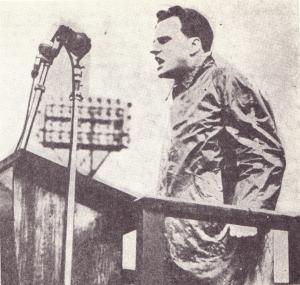I just had the privilege of writing an article for the Christianity Today Theology in the News column. Collin Hansen wrote this column for several years. As one who loved Collin’s essays and counts him a dear friend, it’s an honor to be able to contribute. That honor is compounded by the fact that the founding of CT is a part of my doctoral research at Trinity Evangelical Divinity School. It’s very cool to be writing for the magazine that Carl Henry, the most significant conservative theologian of the postwar period, began in league with Billy Graham and Harold Ockenga (the three horsemen of the neo-evangelical movement).
The article is entitled “Atheists in the Foxholes–as Chaplains” and was just published today. I won’t give the store away, but will give you a snippet of the longer piece here. Here’s the intro:
The military chaplain is a staple of the armed forces. Many have suggested that the sense of mortality that one feels as bullets fly and bombs explode lends itself naturally to prayer and supplication of a divine being. The axiom “there are no atheists in foxholes” emerged based on battlefield scenarios.
There may soon be atheist chaplains in foxholes, however. A recent story in The New York Times, titled “Atheists Seek Chaplain Role in the Military,” covered recent efforts by atheist members of the armed forces to secure chaplaincy positions for atheists. More than 9,000 military personnel self identify as atheist or agnostic, the Times reports, and some claim that many more members of the military adhere to these camps without reporting their preference. Conversely, about 1 million troops say they are Christians. They represent roughly 70 percent of troops and about 90 percent of chaplains.
Another section raises some questions about the pretty tricky matter of how atheist chaplains can offer meaningful support to theists:
The trickiest matter raised in the Times piece and Associated Press coverage of this effort relates to how atheist chaplains in, for example, the Army can fulfill the stated requirement that they not only serve “their own faith groups in the Army” but “also ensure and provide the means for others to observe their own faith in accordance with US law and regulations.” All religious groups make absolutist claims of one kind or another. But how can a belief system—or is it a lack of belief system?—championed by figures like Dawkins and Christopher Hitchens support Christian soldiers in any meaningful sense? When considering chaplains who support Hitchens’s rather broad contention that “religion poisons everything,” how can such leaders “provide the means for others to observe their own faith”? If Christians are indeed suffering from a “God delusion,” as Dawkins has suggested, how can a chaplain who promotes Dawkins’s ideas offer belief-respecting encouragement to a Christian soldier?
Here’s the whole piece. Hope it stimulates some thought. This phrase has been used many times before, but it fits the topic at hand: we are living in “strange times.” It’s unusual to see atheists desiring to be chaplains, to say nothing but the very least. The issue raised in the piece is a real one–is atheism a belief system that can play nice with others, or is it built to attack, by nature a predatory worldview fundamentally intolerant of all others? I make the case that Christianity, for example, has far more resources by which to tolerate other religions and views than atheism does.
At base, when the bullets are flying, do you want an atheist chaplain to help you? Do you want a chaplain at all? Interesting questions for those who worship the God who rules over all the earth, including the battlefield.











